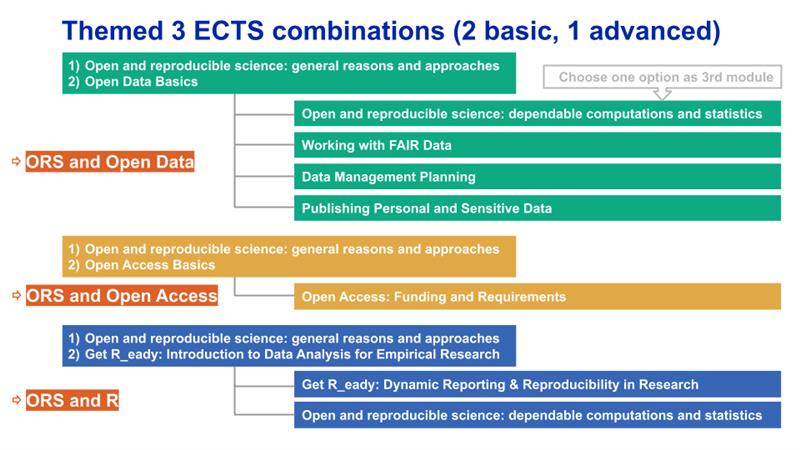Navigation auf uzh.ch
Navigation auf uzh.ch
Center for Reproducible Science
Open Science Office
Description
The course is divided in six topics. Each topic is introduced on a conceptual level and the concepts are practiced through homework and in-class tasks that involve the free software environment for statistical computing and graphics R.
These topics are taught in seven two-hour in person training meetings with digital input and homework in between. In this flipped classroom students are required to learn about concepts at their own pace using provided video and reading material and complete tasks before an in-person session. The steady use of R allows participants to gain experience and confidence in its use with the help of the lecturers over the course of seven weeks. Assignments and the in-person session contain peer and staff feedback and assessment.
Target group
Students of all disciplines which are working at least in part empirically and who have had an introduction to empirical research. Intermediate IT skills are a prerequisite: students need to know the file tree structure on their device (where is a file?) and need to be able to install packages and programs. Students need to have basic R skills, that is they need to know how to assign values to an object, how to manipulate and extract the entries of an object, how to do simple calculations on objects such as percentages, how to use functions such as t.test and how to create simple plots. Students who do not have these skills can work through the first three lessons of "R for Social Scientists" at https://datacarpentry.org/r-socialsci/.
Course dates
Tuesday 16.00 - 18.00
20.09.2022, 27.09.2022, 04.10.2022, 11.10.2022, 18.10.2022, 25.10.2022, 01.11.2022
Offered in
Every semester
Assessment / ECTS Credits
Portfolio assessment: 70% of all input, homework and in-class have to be passed to receive the credit point.
1 ECTS
Description
The course is divided in five topics. Version control through Gitlab and the tricks and techniques learned in Reproducible computing are practiced throughout the seven course weeks. Students acquire and practice skills in R programming such as the writing and use of bespoke functions as well as unit testing. The practice part includes several aspects of Good Statistical Practice such as the correct use and interpretation of p-values, sample size calculations, multiple and sequential testing. The course concludes with a summary look at meta data and their importance for reproducibility.
These topics are taught in seven two-hour in person training meetings with digital input and homework in between. In this flipped classroom students are required to learn about concepts using provided video and reading material and complete tasks before an in-person session. The repeated use of advanced R techniques that increase the reliability of computations allows students to gain enough skills for more complex data analytical projects. Assignments and the in-person session contain peer and staff feedback and assessment.
Target group
Students of all disciplines which work at least in part empirically. The participants have gained first experience with research, are active users of the scientific literature and had an introduction to statistics. Good computer knowledge is expected including experience in R (participants are comfortable in manipulating data and objects and know how to use existing functions and packages).
Course dates
Tuesday 16.00 - 18.00
08.11.2022, 15.11.2022, 22.11.2022, 29.11.2022, 06.12.2022, 13.12.2022, 20.12.2022
Offered in
Every FS and HS22
Assessment / ECTS Credits
Portfolio assessment: 70% of all input tasks, homework and classroom tasks must be solved to receive the credit point.
1 ECTS
While it is generally commended that all data underlying a scientific article is published, researchers working with personal and/or sensitive data often refrain from doing so because of ethical or legal reasons or because they do not know how. However, even personal and/or sensitive data can be shared if individuals have been de-identified (with anonymization or pseudonymization techniques) and if study participants have agreed to the sharing of their (de-identified) data. Besides these ethical considerations when sharing data, researchers must also be knowledgeable in the choice of licence for their data and relevant copyright restrictions. In this course, students will require the necessary skill-set to address such legal and ethical issues to eventually publish personal and/or sensitive data.
This course is intended for Master's and PhD students and interested Bachelor's students working with personal and/or sensitive data. Participants working with quantitative data are required to have some prior working knowledge of R.
Thursday, 27.10.2022 (13.00 - 17.00)
Thursday, 03.11.2022 (13.00 - 17.00)
The course will be held in English.
Offered in
Every semester
Written assessment / 1 ECTS
Der Kurs will be held in collaboration with the University Library Zurich.

If you need background knowledge before attempting a module which contains advanced topics for you or if you want to deepen or broaden your knowledge in a specific direction you can combine the Open and Reproducible Science Modules with Modules on Open Access/Open Data and/or Modules from Get R_eady, also offered at the School for Transdisciplinary Studies.
We suggest three combinations totalling 3 ECTS, these specific combinations logically fit together in a theme but all other module combinations are allowed as well.